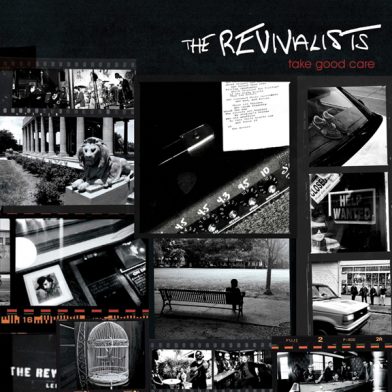 To get the obvious question out of the way: Does the Revivalists’ fourth album have another “Wish I Knew You” on it? And the answer is, sure: The two advance singles, “All My Friends” and “You and I,” are easily as grabbing as the breakthrough hit; “Friends” in fact may be the catchiest tune the band’s yet written. Neither is a carbon copy of the previous hit, but if you liked the Revivalists’ way around a groove, and David Shaw’s brand of emotive singing, you’ll find the same attractions here. “All My Friends” even has another chorus reference to getting high, if that’s what you dug about “Wish I Knew You.”
To get the obvious question out of the way: Does the Revivalists’ fourth album have another “Wish I Knew You” on it? And the answer is, sure: The two advance singles, “All My Friends” and “You and I,” are easily as grabbing as the breakthrough hit; “Friends” in fact may be the catchiest tune the band’s yet written. Neither is a carbon copy of the previous hit, but if you liked the Revivalists’ way around a groove, and David Shaw’s brand of emotive singing, you’ll find the same attractions here. “All My Friends” even has another chorus reference to getting high, if that’s what you dug about “Wish I Knew You.”
Albums that follow a breakthrough hit tend to sound like day-of-reckoning albums, but the Revivalists already did that last time around: Men Amongst Mountains was effectively the band dealing with the downside of its road up. Most of the songs were about pushing and persevering and “Wish I Knew You” was one of its few purely joyful moments. In contrast, Take Good Care is an album that revels in being alive and in love. After a deceptively subtle opener (the African-influenced “Otherside of Paradise,” on which the band wisely holds back from charging in) the mood of the album takes a sharp curve upward. “Got Love,” “Change” and the two singles are all ebullient songs that get high on soul and swagger. If “Celebration” didn’t already live up to its title, there’s a key change midway through to push it higher. Not until track nine does Shaw voice a darker sentiment—“God damn, I hate to love you”—but even that becomes more a pledge of devotion.
Despite the use of multiple producers and locations (some was recorded in New Orleans and some in Nashville), the album manages a cohesive sound by reining in the jam-band tendencies (only two songs top four minutes) and focusing on the guitar/keyboard instrumental core, using the horns more sparingly as a seasoning. They still get plenty of space to be eclectic, most surprisingly on “Oh No” and “Future,” which evince a ’60s garage influence—a pox on the syndicated reviewer who said it sounded like the Strokes. That same reviewer found fault with “Shoot You Down,” the anti–gun violence song (doubling as a gesture of friendship) that closes the album, but to these ears the song’s chorus (“Can we for once just like without guns/ I’ll tell no lie, we’re not born to just die”) is both plainspoken and meaningful. The closing number’s acoustic setting also works fine; you can’t have a good revival without a little benediction.



